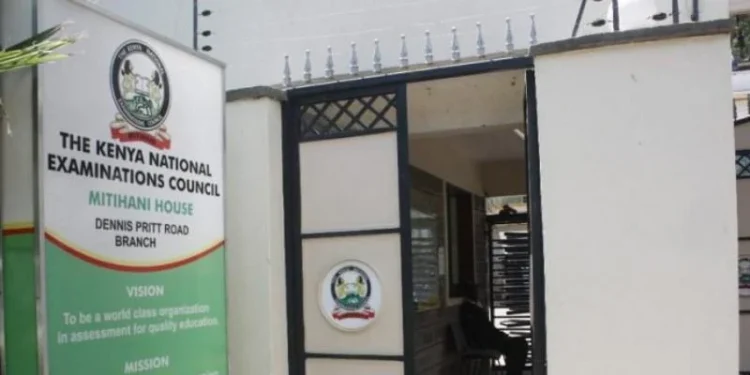KNEC: 2025 Diploma in Special Needs Education (SNE) Examination Timetable & Instructions.
Trainers must ensure that candidates thoroughly read and understand these instructions and guidelines. Candidates should be made fully aware of the consequences of engaging in examination malpractice or misconduct.
GENERAL INSTRUCTIONS TO CANDIDATES
Candidates must be seated in the examination room at least ten minutes before the scheduled start of each paper. Examinations commence at 8:30 a.m., except for KSL practicals, which begin at 9:00 a.m. Those arriving late must provide a valid reason to the Supervisor. Candidates arriving more than thirty minutes late will only be allowed to sit the exam under exceptional circumstances. Punctuality is mandatory for all sessions.
Candidates should verify that they have received the correct question paper. If they receive an incorrect paper or if any required materials, such as maps, are missing, they must immediately inform the Supervisor. Additionally, candidates should review the first page of the question paper for general instructions, including restrictions on the number of questions to be answered. Every page of the question paper should be checked for completeness.
Candidates must write their name and index number on the answer booklet. Writing should be done on both sides of the paper, avoiding the margins. Each section of a question must begin on a new line, with the question number clearly written in the left-hand margin. The question itself should not be copied. A blank line should be left after each answer.
Candidates should use blue or black ink, either from a ballpoint pen or fountain pen. Pencils should only be used for diagrams. Required mathematical or drawing instruments should be brought as needed.
Each question must be read carefully to avoid wasting time on unnecessary information that does not earn marks. Candidates should distribute their time wisely across all questions, ensuring that no single question receives excessive attention. At the end of the examination, candidates must ensure their index number is written on the booklet before handing it over to the Supervisor or Invigilator.
Candidates intending to withdraw from the examination must notify the Kenya National Examinations Council (KNEC) in writing before the exam begins.
CAUTION TO CANDIDATES
Candidates are not permitted to leave the examination room before the end of the allocated time unless they receive special permission from the Supervisor. In such cases, they are prohibited from carrying the question paper or answer booklet out of the room.
Examination answers must not be left in a position where other candidates can read them. No candidate should attempt to give or receive assistance, whether through copying or any other means. Any form of cheating is strictly forbidden.
Communication between candidates or with external persons is not allowed during the examination. The only materials permitted in the examination room are the question paper and any additional resources explicitly authorized by KNEC.
Candidates may only use mathematical tables provided by KNEC, which must contain no additional notes apart from the printed content. If using a calculator, it must be a non-programmable model as specified by KNEC regulations. Candidates uncertain about their calculator’s eligibility should seek clarification from the Supervisor.
If a question paper is misprinted, smudged, or contains errors, candidates must return it to the Supervisor immediately. Additionally, no candidate is allowed to take any used or unused writing paper from the examination room. Any rough work should be done in the official answer booklet and left on the desk for collection and disposal by the Supervisor.
Any form of misconduct or disturbance inside or near the examination venue will be regarded as an examination irregularity. Electronic communication devices, including cell phones, are strictly prohibited in examination centres. Any candidate found in possession of a cell phone or any electronic device will have their results cancelled.
PENALTIES FOR EXAMINATION IRREGULARITIES
The KNEC Act No. 29 of 2012 outlines the offences and penalties for examination irregularities in Sections 27 to 40. Key provisions include:
- If a candidate is found guilty of an examination irregularity in any paper, their entire subject results will be cancelled. They will not receive a result and will be awarded a “Y” overall.
- If widespread irregularities are detected in an examination centre, results for the entire centre will be nullified.
Any person who gains unauthorized access to examination materials and discloses their contents, whether in writing or verbally, to an unauthorized individual—including candidates—violates Section 27 of the Act. The penalty for this offence is imprisonment for up to ten years, a fine of up to two million shillings, or both.
Read Also: Diploma in Special Needs Education (SNE): Application Guide, Requirements, and Fee Structure
Any person who intentionally or maliciously damages examination materials contravenes Section 30 of the Act. This offence is punishable by imprisonment for up to five years, a fine not exceeding five million shillings, or both.
Anyone impersonating a candidate by attempting to sit an examination on their behalf, despite not being registered for the KNEC examination, is in violation of Section 31 of the Act. Such an individual will face imprisonment for up to two years, a fine of up to two million shillings, or both. Furthermore, they will be barred from taking any KNEC-conducted examination for three years.
To avoid cancellation of results, candidates must ensure they do not engage in any form of examination irregularity.
KNEC: 2025 Diploma in Special Needs Education (SNE) Examination Timetable & Instructions.



Discussion about this post